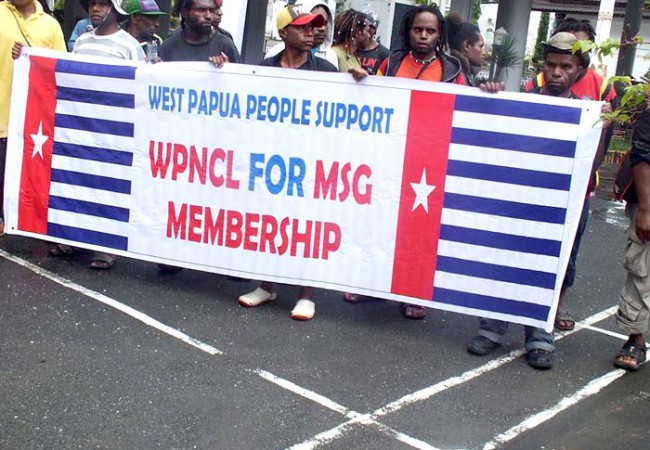
West Papua – an unfinished agenda
After boycotting the foreign ministers’ visit, Vanuatu has since defended its decision not to be part of the MSG visit to Indonesia. It would appear that as long as the present Vanuatu government remains in power, Jakarta knows it has a friend whose heart will require more than aid or trade to win over.
Critics’ use of the word ‘hijacked’ could not be more pointed when one considers that the MSG mission resulted in a joint statement that disowned the MSG’s very own communiqué of the 19th MSG leaders Summit. A u-turn such as this is not a light matter for the organisation, as it appeared at the time that the MSG had found common ground regarding the thorny issue.
Sensing the re-emergence of an existing divide, FLNKS leader and MSG Chairman Victor Tutugoro has reacted quickly by offering to host a separate meeting in Vanuatu to address the conflicting views. Director-General Peter Forau confirmed a special leaders’ meeting would be held this month to discuss the issue further. If this happens, it will be a great opportunity to revisit the MSG communiqué and re-assert the position of each member states.
Despite this, the MSG chairman still believes the mission was ‘revealing’, even if the delegation did not have any opportunity to meet freely with West Papuans themselves. For him to make such a glowing statement about the visit, notwithstanding the views expressed to the contrary, would seem to suggest that indeed an opening might have been found with Indonesia. For 10 years or more, Indonesia had effectively shut out the international community from entering West Papua unless you were a tourist. It was the first time such a high-level international delegation was allowed in.
There will be questions though, over whether Indonesia played the game wisely following its handling of the MSG visit. In a digital age such as today, Indonesia knows it needs to reconsider its media strategy. It is clear its diplomatic blitz so far has not worked. More importantly, the poor light cast on West Papuan’s appalling social indicators does not help Indonesia’s cause.
If president Susilo Bambang Yudhoyono is to be credited for giving West Papuans some form of ‘autonomy’, he clearly will need to do more to address key political and economic issues facing the indigenous populations in order to win the heart of countries such as Vanuatu. On the face of it, he seems determined. Just after meeting the MSG foreign ministers, the president has since visited the troubled provinces. With elections around the corner, he could leave a lasting legacy.
However, the latest twists since the controversial visit shouldn’t come as a surprise for anyone. Historically, right up to the time WPNCL formally lodged their application, the four member states have been divided. Papua New Guinea would rather their Melanesian cousins remain part of Indonesia. Sharing a border with them, Indonesia offers enormous economic and trade opportunities that have yet to be harnessed. But more importantly, to be overtly supporting the West Papuan cause would be like waving a red flag in front of a bull. Fiji, on the other hand, has always ‘enjoyed close military ties’ with Indonesia. In fact, it has been reported the clause within the MSG communiqué recognising West Papua’s right to self-determination was insisted upon by Vanuatu, Solomon Islands and the FLNKS. Solomon Islands’ sudden change of heart will only become clearer with time while the FLNKS, who share a common burden with the West Papuans, initially supported WPNCL’s application. They have now indicated they might side with the majority because of WPNCL’s contested status.
This is not to say there is no popular support for West Papuan independence among Melanesians everywhere. It is politics that is standing in the way.
Vanuatu remains committed under prime minister Carcasses. Both foreign affairs minister Edward Natapei and special envoy for decolonisation Joe Natuman have said the MSG foreign ministers’ original purpose for the visit had been seriously compromised. Natapei acknowledged the work ahead won’t be so straightforward, now that he has been outnumbered three to one.
WPNCL leader Dr Otto Ondawame is under no illusions the fight will end any time soon. It has been a long walk that has had its highs and lows, and he sees the ruckus, following the MSG foreign leaders’ brief Jayapura call, as further evidence of what they have been campaigning against for decades.
Vanuatu’s support dates back to 1980s, when Fr. Walter Lini famously said during an address that ‘Vanuatu is not free until all Melanesia is free’. Mr Carcasses has repeated this statement a number of times. As the first non-indigenous prime minister, he has enjoyed some measure of political stability to date, but wants to be seen to be living up to one of the dreams of the country’s founding father.
Politics notwithstanding, WPNCL’s application remains. One would hope there is still room for dialogue from all sides, once the MSG leaders meet to find a way out.
